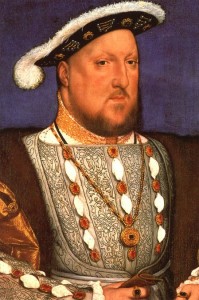 Henry VIII is an iconic figure who divides opinion. Whenever I post anything about him here on the Anne Boleyn Files or on social media, I always get a very mixed response with some saying that he was a tyrant and monster, others saying that he was a great king, still others saying that he started out as a good king but ended his reign a bad king… very mixed views.
Henry VIII is an iconic figure who divides opinion. Whenever I post anything about him here on the Anne Boleyn Files or on social media, I always get a very mixed response with some saying that he was a tyrant and monster, others saying that he was a great king, still others saying that he started out as a good king but ended his reign a bad king… very mixed views.
In an article Henry the Great? back in 2010, I discussed some of Henry VIII’s achievements and I quoted David Starkey, who, in his book Virtuous Prince, talks about there being two Henrys: the youthful virtuous prince and the old tyrant. We have this Henry:
“Holbein’s Henry is the king of his last dozen or so years, when he was – in Charles Dickens’s glorious phrase – a spot of blood and grease on the history of England. This is the hulking tyrant with a face like Humpty Dumpty of nightmare, who broke with Rome and made himself supreme head of the church; who married six wives, of whom he divorced two and divorced and executed two others; who dissolved six hundred monasteries; demolished most of them and shattered the religious pieties and practices of a thousand years; who beheaded nobles and ministers, including those who had been his closest friends, castrated, disembowelled and quartered rebels and traitors, boiled poisoners and burned heretics”
but
“This is also the king who reinvented England; presided over the remaking of English as a language and literature and began to turn the English Channel into the widest strip of water in the world. He carried the powers of the English monarchy to their peak.”
I concluded that article with a Harry Potter reference (I do love Harry Potter!). It’s like when wandmaker Garrick Ollivander tells Harry Potter that Voldemort did “great things” with his wand, “terrible, yes, but great”. It is hard to reconcile Henry’s achievements and his generosity with the man who was responsible for the executions of people like Thomas More, Bishop Fisher, the Carthusian monks, Anne Boleyn, Margaret Pole… Perhaps we just need to consider that nobody is all good or all bad, and we will never be able to get into the mind of a 16th century king or appreciate the context of the times. I don’t know!
What do you think? Share your view by taking part in this poll: